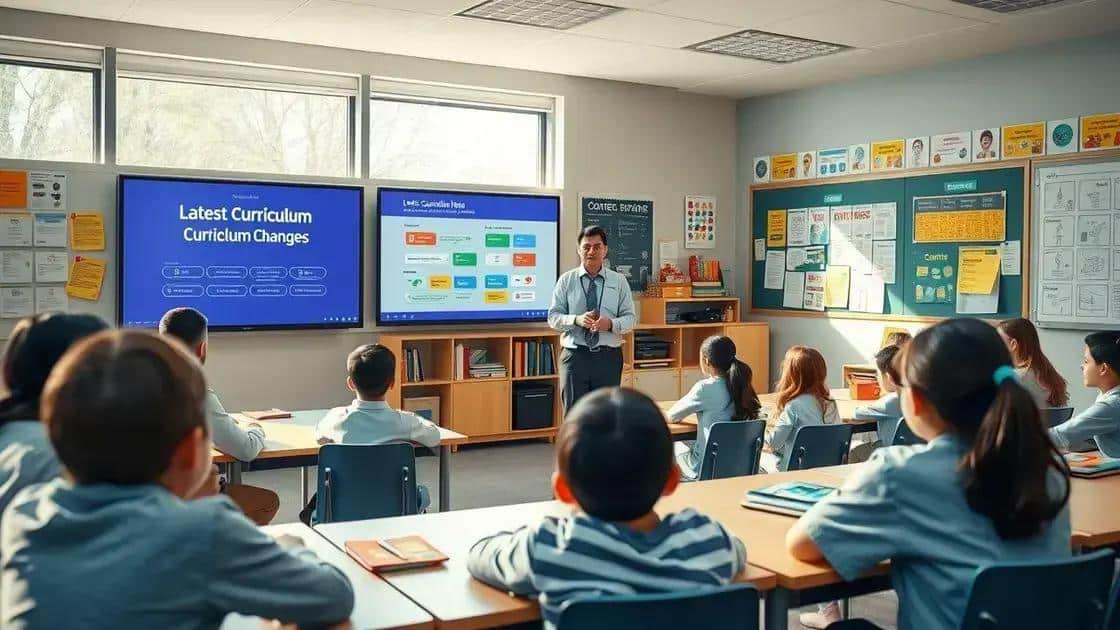Respond textbook policy updates: what you need to know

Staying informed about textbook policies is essential for educators, enabling them to choose effective materials, comply with regulations, and enhance students’ learning experiences through professional development and collaboration.
Respond textbook policy updates are crucial for anyone involved in education. With changes happening frequently, it’s important to stay informed about how these policies can affect teaching and learning. What do these updates mean for your classroom?
Understanding the latest textbook policy changes
Understanding the latest textbook policy changes is essential for educators and students alike. Staying informed helps you navigate the shifting landscape of educational resources. As policies evolve, they can influence how materials are selected, used, and distributed in schools.
One key aspect to consider is how these changes affect curriculum development. It’s important to recognize that policies may dictate the types of textbooks and resources available for use. For instance, new guidelines might encourage adopting digital formats over printed versions. This shift can enhance accessibility for learners.
Impacts on curriculum development
Textbook policies often spark significant changes in curriculum design. They impact not only what is taught but how it is taught.
- Alignment with educational standards
- Integration of diverse resources
- Cost considerations for schools
- Encouraging innovative teaching methods
Additionally, these policies might promote a more inclusive approach to education. By selecting materials that reflect a range of perspectives, educators can create a more engaging learning environment for students. This inclusivity fosters a sense of belonging and relevance in education.
As an educator, you might wonder how to adapt effectively to policy updates. Being proactive is key. Consider establishing a process for reviewing and revising your teaching materials regularly. This could involve gathering feedback from students and other educators to ensure that your resources remain relevant and effective.
How educators can adapt to policy updates
Adapting to changes requires flexibility and a willingness to learn. Attending professional development workshops can provide insights into the latest practices and resources available.
- Engage in collaborative discussions with peers
- Subscribe to educational journals
- Utilize online platforms for resource sharing
- Participate in webinars or online courses
Ultimately, staying ahead of textbook policy changes ensures that you are not only compliant but also equipped to offer the best learning experience to your students. By keeping yourself informed, you empower your students and enhance their educational journey.
Impacts on curriculum development

Impacts on curriculum development are significant due to recent textbook policy changes. These alterations can reshape the way subjects are taught in schools. They guide educators in the materials they choose and the strategies they implement in their classrooms.
One major effect of updated policies is the need to align with new educational standards. Schools must select textbooks that meet these criteria to provide students with relevant and effective learning resources. This necessity often leads to changes in the core subjects being taught.
Shifting learning methods
As policies evolve, schools may encourage more innovative teaching methods. This might include an emphasis on technology integration, such as using digital textbooks and online resources.
- Enhancing student engagement through interactive materials
- Facilitating personalized learning experiences
- Encouraging collaborative projects among students
- Utilizing data to inform instructional practices
These shifts can create a more dynamic and participatory classroom environment. With new resources at their disposal, teachers have the opportunity to inspire creativity and critical thinking in students.
Moreover, embracing diverse resources can make learning more inclusive. Schools are now tasked with selecting materials that reflect a variety of perspectives and cultures. This inclusivity can foster a more well-rounded education that resonates with all students.
Challenges faced by educators
Despite these opportunities, educators face challenges when adapting to new textbook policies. Balancing compliance with creativity can be complex. Teachers may need support to understand how to navigate these changes effectively.
- Access to professional development resources
- Collaboration with peers for sharing best practices
- Regular feedback from students to improve material selection
- Openness to experimenting with new teaching methods
Continuously engaging with these challenges allows teachers to provide quality education while aligning with the latest policies, ensuring that students receive the best possible learning experience.
How educators can adapt to policy updates
How educators can adapt to policy updates is a critical topic in today’s educational landscape. As policies change, teachers must find effective ways to adjust their practices to meet new requirements. This adaptability not only ensures compliance but also enhances the learning experience for students.
One effective strategy is for educators to actively pursue professional development opportunities. Workshops and training sessions can provide valuable insights into new policies and best practices. Staying informed about the latest trends can empower teachers to make informed decisions.
Collaborating with peers
Collaboration among educators is essential for successfully navigating policy updates. By sharing experiences and ideas, teachers can learn from each other, which can result in improved teaching methods.
- Forming professional learning communities
- Engaging in team teaching
- Participating in joint curriculum planning
- Creating a supportive feedback loop
These collaborations can enhance motivation and create a sense of community among staff. When teachers work together, they can better address challenges and discover effective solutions.
Another important aspect of adapting to changes is being flexible with teaching methods. Educators should be open to experimenting with different instructional strategies. This might involve integrating technology or adopting project-based learning approaches to increase student engagement.
Seeking student feedback
Listening to student feedback can also guide educators in their adaptations. Students often have unique insights into what works and what does not in the classroom. Incorporating their perspectives can help teachers refine their materials and instructional approaches.
- Conducting surveys to gather input
- Implementing suggestion boxes for anonymity
- Hosting open discussions with students
- Using student assessments to improve teaching
Ultimately, being proactive and responsive to feedback allows educators to create a more responsive and dynamic classroom environment. This approach not only meets policy requirements but also enriches the educational experience.
Resources for staying informed on textbook policies

Resources for staying informed on textbook policies are vital for both educators and students. With frequent changes in educational policies, having access to reliable information is crucial to navigate the complexities of textbook selection and use.
One excellent resource is educational websites that specialize in textbook policies. These sites often provide updates on policy changes, making it easier for educators to stay current. Additionally, subscribing to newsletters from these organizations can deliver timely information directly to your inbox.
Professional organizations
Joining professional organizations can be a game changer. These groups often offer resources such as publications, webinars, and networking opportunities.
- Access to research articles and policy analysis
- Workshops focused on new textbook implementations
- Networking with other educators facing similar challenges
- Forums for discussions on best practices
Collaboration with peers is another way to stay informed. Regularly meeting with colleagues allows educators to share insights about policy changes or new resources they discover. This collective approach can strengthen a school’s curriculum and enhance teaching methods.
Furthermore, universities and educational institutions often have dedicated resources for faculty. These include access to academic journals, workshops on the latest educational trends, and training sessions focused on textbook policy updates. Leveraging these resources can make it easier to adapt to changes.
Online platforms and communities
In addition to formal organizations, online platforms provide a wealth of information. Social media groups and online forums can be valuable spaces for educators to connect and exchange information about textbook policies. Engaging in these communities helps to share strategies for adapting to changes.
- Participating in Facebook or LinkedIn groups focused on education
- Following education influencers on platforms like Twitter
- Utilizing educational blogs for expert opinions
- Watching YouTube channels that cover textbook policy discussions
By integrating these resources into your routine, you can ensure that you remain well-informed about changing textbook policies. Staying proactive in your search for information allows you to enhance the teaching experience for yourself and your students.
FAQ – Frequently Asked Questions about Staying Informed on Textbook Policies
Why is it important to stay informed about textbook policies?
Staying informed helps educators select the best materials, comply with regulations, and enhance the learning experience for students.
What are some reliable resources for updates on textbook policies?
Educational websites, professional organizations, and newsletters provide valuable insights and updates regarding textbook policies.
How can collaboration with colleagues assist me in adapting to policy updates?
Collaborating allows educators to share strategies, insights, and resources, which can lead to a more effective approach in adapting to changes.
What role does student feedback play in adapting to textbook policies?
Student feedback provides essential insights that can help educators refine their materials and methods, ensuring a more engaging learning environment.





